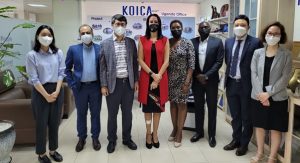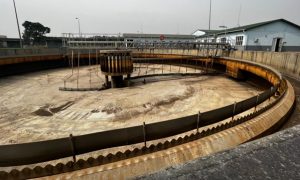On 13th September 2021 KOICA and GGGI signed the project grant agreement to commence the implementation of the ‘Strengthening Solid Waste and Feacal Sludge Management Capacity of the Greater Kampala Metropolitan’ project phase 1. This phase starting from 2021 to 2023, will focus on development of strategies, implementation plans and technical designs for proposed interventions in selected areas. KOICA has allocated USD 2.25 million to facilitate the project implementation and this has been further supplemented with USD 100,000 GGGI contribution to bring the total project budget to USD 2.35 million.

Figure : The GGGI project team with KOICA,
The project goal is to strengthen the solid waste and fecal sludge management capacity of the GKMA, and this will be achieved through three project outcomes. Outcome 1 is to have an ‘Improved integrated planning for sustainable solid waste and fecal sludge management in the GKMA’ which will focus on developing a Solid waste and fecal sludge management strategy, planning and implementation plans for GKMA. Outcome 2 is to have an ‘enhanced solid waste management in the GKMA’ and will be attained through developing detailed site-specific technical, business, and O&M plans for one (1) waste collection center (including sorting and diversion facilities) for a selected municipality in the GKMA. And finally, outcome 3 which is to have ‘enhanced fecal sludge management in the GKMA’ and this will be advanced by preparing detailed site-specific technical, business, and O&M plan for one (1) fecal sludge treatment plant (FSTP) for a selected municipality.
It all started in 2019. GGGI and KOICA entered a partnership to develop a waste and sanitation project to serve the Greater Kampala Metropolitan Area. With this, GGGI started the project scoping and development exercise where the Ministry of Water and Environment was identified as a key partner and the line ministry to support this endeavor.
In the two succeeding years, a project to enhance solid waste and fecal sludge management in the greater Kampala area while increasing access to sustainable services and creating green jobs through the waste-to-resource approach was developed. This project titled Strengthening Solid Waste and Feacal Sludge Management Capacity of the Greater Kampala Metropolitan Area was developed by GGGI through consultation and collaboration with its partners including the Ministry of Water and Environment, National Water and Cooperation as well as Kampala Capital City Authority and other Greater Kampala Metropolitan Area municipalities. This project will focus on strengthening solid waste management and fecal sludge management capacity based on inclusive and decentralized solutions that will enhance sustainability and is in line with the Government of Uganda’s strategy to mobilize increased financing and support towards sustainable and inclusive socio-economic development of greater Kampala.
The Greater Kampala Metropolitan Area (GKMA) with a population of approximately 4 million people spread over 970 square km has challenges in both solid waste and feacal sludge management. Approximately 3,206 tons of solid waste is produced per day with a 30% waste collection rate and only one licensed solid waste disposal and treatment facility in Kiteezi, which is currently operating beyond its capacity. While Faecal sludge management largely relies on on-site sanitation and only 1% of GKMA has access to the sewer system. Onsite sanitation is largely traditional pit latrines and improved latrines as well as septic tanks especially utilized by the middle to high income households. These on-site facilities are generally not properly maintained and emptied, especially in the low-income informal areas, because of high costs and difficulties in accessing cesspool trucks.
In early 2022, a team of five was recruited to execute the project goal and objectives. This project team is composed of a project manager, deputy project manager, senior officer-feacal sludge management, senior associate-waste and sanitation and a senior associate-finance.
Following this, the undertaking of project activities has commenced with a fact-finding consultation with critical stakeholders and key location site visits to assess the current solid waste management and feacal sludge management state of affairs in the GKMA. This has included engagements with KOICA, the Ministry of Water and Environment (MWE), Ministry of Lands, Housing and Urban development (MoHLUD), National Water and Sewerage Corporation, the World Bank and various local governments including KCCA, Wakiso district office, Kira municipality and Mukono municipality. A couple of more consultations are planned with key stakeholders such as National Planning Authority (NPA), NEMA (National Environment Management Authority) and MEMD (Ministry of Energy and Mineral Development), and it is expected to engage contractors for the feasibility studies in early 2022.

Figure 2 GKMA sanitation facilities (Nakivubo Wastewater treatment plant
Key site visits undertaken have been to GKMA sanitation facilities (Nakivubo Wastewater treatment plant and Lubigi Feacal Sludge treatment plant) and solid waste facilities (Katikolo dump site and KCCA Waste Recycling Center-Wankoko).

Figure 3 KCCA Waste Recycling Center-Wankoko
In conclusion, the project impact objective is to support Uganda to achieve a strong, inclusive and sustainable economic growth by promoting sustainable development and inclusive green growth through increasing access to public services in water, sanitation, and waste management.